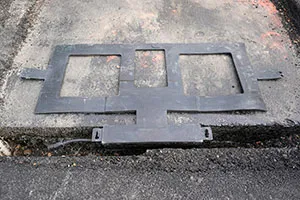Detroit Testing Electric Vehicle Chargers Beneath Streets

[Stay on top of transportation news: Get TTNews in your inbox.]
DETROIT — Crews have installed what’s billed as the nation’s first wireless-charging public roadway for electric vehicles beneath a street just west of downtown Detroit.
Copper inductive charging coils allow vehicles equipped with receivers to charge up their batteries while driving, idling or parking above the coils.
The quarter-mile segment of 14th Street will be used to test and perfect the technology ahead of making it available to the public within a few years, according to the Michigan Department of Transportation.
Demonstrations were held Nov. 29 at Michigan Central innovation district, a hub for advancing technologies and programs that address barriers to mobility. The district also is where Ford Motor Co. is restoring the old Michigan Central train station to develop self-driving vehicles.
The technology belongs to Electreon, an Israel-based developer of wireless charging solutions for electric vehicles. The company has contracts for similar roadways in Israel, Sweden, Italy and Germany. The pilot initiative in Michigan was announced in 2021 by Michigan Gov. Gretchen Whitmer.
“Alongside Michigan’s automotive expertise, we’ll demonstrate how wireless charging unlocks widespread EV adoption, addressing limited range, grid limitations, and battery size and costs,” said Stefan Tongur, Electreon vice president of business development. “This project paves the way for a zero-emission mobility future, where EVs are the norm, not the exception.”

An in-road wireless charging coil to be installed below a street surface is shown in Detroit. (Paul Sancya/Associated Press)
When a vehicle with a receiver nears the charging segments, the coils beneath the road transfer electricity through a magnetic field, charging the vehicle’s battery. The coils only activate when a vehicle with a receiver passes over them.
Tongur told reporters the roadway is safe for pedestrians, motorists and animals.
The state Department of Transportation and Electreon made a five-year commitment to develop the electric road system. The DOT is expected to seek bids to rebuild part of busy Michigan Avenue, where inductive charging will also be installed.
As electric vehicles increase in popularity in the United States, the Biden administration has made its plan for half a million EV charging stations a signature piece of its infrastructure goals.
The wireless-charging roadway helps puts Michigan and Detroit at the forefront of electric vehicle technology, officials said.
“In Michigan, we want to stay ahead of the curve. We want to lead the curve,” Michigan DOT Director Bradley C. Wieferich said.
No decisions have been made on revenue models in Michigan, Tongur said.
“The technology is smart,” he said. “The technology knows who you are — you’re a verified and authentic user — you can get a charge.”
Want more news? Listen to today's daily briefing below or go here for more info:




